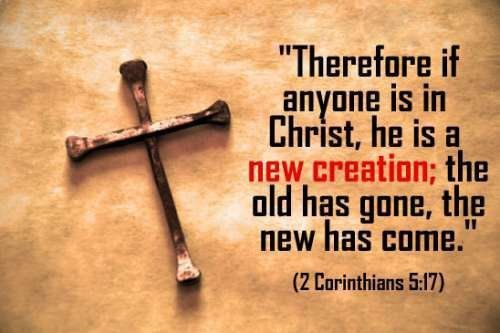In the course of my writing, I often work through things that are more observations and thoughts in progress – not fully-formed ideas. These come with a lot of assumptions and background of which only I am aware. So, for example, in my writing yesterday, I launched right into an analysis and study of passages in John’s first letter in a way to observe that the Pew Forum’s number of Christians in America was far from the reality. I listed several verses from the letter to show what a Christian should look like, without really coming out clearly to say what a Christian really is.
But first, let me try to clear up any confusion by saying I’m not necessarily looking at specific people when I write about this. While some should be obvious, there are many more for which that judgement call is nearly impossible. We should all know that ultimately, God is the one who sees hearts and knows the truth of who truly believes. But still, we are called to be discerning in our associations, and perhaps I’m especially sensitive about this. I’ve written before about the tragedy of Christians associating with any particular political party, and even the claims that America is a “Christian” nation (although one would think so if 80% of its citizens really were Christian).
So while my approach is far from perfect, I thought it sufficient given the overall theme of my writing – that there is no way that 80% of Americans are Christians, and you can see that simply by observing their general actions against how the Bible says they should be acting. John’s first letter is certainly not a checklist for us to use to determine if we’re in or not, but when it says, for example, that we know the Christians because they obey God’s commands, and then we see obviously more than 20% of Americans blatantly going in the opposite direction, it should give us room for thought.

In reality though, how we live does matter. Not that it gets us to heaven, but that (for Christians) it serves as a witness to our commitment to God and his glory. He will do as he does when it comes to saving people, but part of what he does involves the actual Christian on the ground, and so we should live our lives in a way that really can’t be faulted (in as much as we can). Peter says so in his first letter – “Keep your conduct among the Gentiles honorable, so that when they speak against you as evildoers, they may see your good deeds and glorify God on the day of visitation…For this is the will of God, that by doing good you should put to silence the ignorance of foolish people.” (2:12 and 15). If I had a quarter for every time I heard someone tear down Christianity because of the blatantly non-Christian way some of its claimants act, I’d be a rich man. And so yes, it is something to which I (and other Christians) should pay some attention. I myself struggle with things all of the time, so I understand how hard it can be. But, like I said yesterday, if my sins don’t bother me, then I couldn’t in any kind of conscience at all call myself a Christian.
Really then, what is a Christian? From the outside (and Jesus comes right out and says this), it would be evidenced by the fruit they bear. I’m not saying the fruit is the factor – I’ve written about that here. In truth, only the person (and God) themselves can know if they’ve truly accepted the tenets of the faith. But those tenets are also apparent in a clear and honest reading of the source document: Knowledge of, Assent to, and Trust in Jesus Christ as our sole means to restore a complete and non-adversarial relationship with God, the true creator and sustainer of the universe.
All three of these things work together: we should know Jesus Christ, his person and his purpose. But this is not enough (remember, the Bible itself tells us that the demons know him). We also must assent to the fact that what we know about him is true. But again, still not enough. We must then trust all of these things, and in that trust, act upon them accordingly. I’ve seen this captured in various ways. The simplest is perhaps in the analogy of the chair – we know what a chair is and how it functions, we assent to the fact that it does indeed hold us up when we sit down, but until we’re willing to actually sit on it (trust), we have not really shown a faith that it will actually work.

This, of course, is an imperfect analogy, but it does illustrate the point. The position I’ve taken in my writing is that it seems there are far too many Americans who will gladly tell you that they know what a chair looks like and what it’s supposed to do, but they’re unwilling to sit in it. Some of the deniers are obvious. They don’t even acknowledge the chair’s existence. They call it an illusion and are content to spend their lives standing (as a matter of fact, they think it perfectly natural to stand, and anyone who wants to sit is actually deluded in some way). But for others, it’s far more subtle. They go through their lives telling us they know about chairs and what they do, but it seems they’re always just kind of milling around – you never actually see them sitting down.
It’s easy to say you believe in Jesus – and again, I can’t be the judge as to whether that’s true or not – but really, if you’re not showing a life affected by that proclamation — something the Bible tells you will happen — I’m left wondering.
In the end though, when it comes to that number – the 246,780,000 Americans who claim to be Christian – I can find no starker example than this:
“Though I was confirmed at a Presbyterian church as a child, I now consider myself to be a nondenominational Christian.”
President Donald Trump, October 2020
If you’re willing to believe the number should actually be 246,779,999 because of that, it shouldn’t be too hard to get to an even lower number. And that’s kind of my point.

